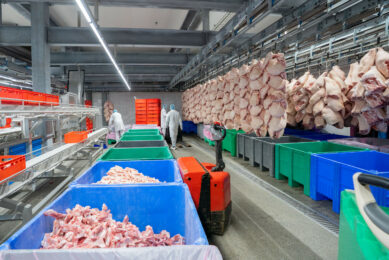USMEF report: China’s hog industry
With hundreds of millions glued to home television sets and factory canteens running on low speed, the normal summer lows of pork consumption are being exacerbated by China’s hosting of the Olympic games. This lull comes as China’s hog herd has expanded close to double-digit levels year on year, with producers responding to strong industry profitability over the past nine months.
“Olympic impactâ€
Reports from USMEF offices in China point to a negative “Olympic impact†on pork consumption. The effect is more pronounced in Beijing, where tourists have not offset the sharply reduced local customer traffic in many restaurants.
Some have even chosen to close for the three-week run of the Olympic games. USMEF-China also notes that urban clean-up campaigns linked to Olympic events have curtailed street-hawker activity. As a result, huge volumes of imported pork and poultry products have stacked up in Chinese cold stores, with some facilities reporting 100 percent capacity.
National distribution of imports has also been affected by the Olympics, as increased security on roadways has slowed product movement. Finally, falling domestic prices have narrowed the spread between the wholesale prices for imported pork and local products.
Loss of enthusiasm
With hog numbers surging and consumption weak, hog-raising profitability is dropping quickly. A drop in piglet prices over the past week is an indication of the loss of enthusiasm about the near-term outlook for the market. Reports of swine fever and other disease outbreaks are also adding to negative producer sentiment.
However, if piglet prices keep falling – along with feed prices, which have also been drifting lower in recent weeks after large jumps earlier in the year – hog production breakevens will drop. This is likely to partially offset the decline in the live hog and pork market.
The full report can be accessed on USMEF’s website
Related Website
• USMEF
Subscribe here to the Pig Progress newsletter
Reports from USMEF offices in China point to a negative “Olympic impact†on pork consumption. The effect is more pronounced in Beijing, where tourists have not offset the sharply reduced local customer traffic in many restaurants.
Some have even chosen to close for the three-week run of the Olympic games. USMEF-China also notes that urban clean-up campaigns linked to Olympic events have curtailed street-hawker activity. As a result, huge volumes of imported pork and poultry products have stacked up in Chinese cold stores, with some facilities reporting 100 percent capacity.
National distribution of imports has also been affected by the Olympics, as increased security on roadways has slowed product movement. Finally, falling domestic prices have narrowed the spread between the wholesale prices for imported pork and local products.
Loss of enthusiasm
With hog numbers surging and consumption weak, hog-raising profitability is dropping quickly. A drop in piglet prices over the past week is an indication of the loss of enthusiasm about the near-term outlook for the market. Reports of swine fever and other disease outbreaks are also adding to negative producer sentiment.
However, if piglet prices keep falling – along with feed prices, which have also been drifting lower in recent weeks after large jumps earlier in the year – hog production breakevens will drop. This is likely to partially offset the decline in the live hog and pork market.
The full report can be accessed on USMEF’s website
Related Website
• USMEF
Subscribe here to the Pig Progress newsletter











